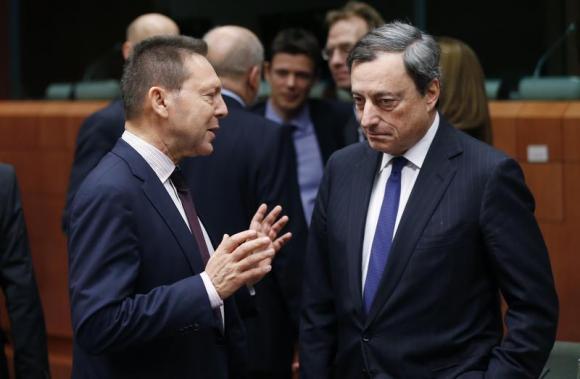(Reuters) – Euro zone finance ministers made progress on Wednesday on some details of a plan to close banks, paving the way for completion of a euro zone ‘banking union’ that is to restore confidence in the financial sector and boost growth.

More than five years into a financial storm that toppled banks and dragged down states from Ireland to Spain, Europe wants to seal its biggest project since the introduction of the euro – a framework to police banks and tackle their problems together.
German Chancellor Angela Merkel underscored the importance of the negotiations to complete the banking union, saying she hoped the ministers would reach a deal before she and other EU leaders meet on Thursday.
“For the acceptance of the euro on financial markets, the banking union is very important,” Merkel said on Tuesday.
That gives finance ministers 36 hours to clinch overall agreement on an agency and fund to shut weak banks to complement European Central Bank supervision of the sector if European Union leaders are to sign off on it this week.
A crucial part of the project was agreed in the small hours of Wednesday after seven hours of talks – how to ensure financing for closing down banks.
This agreement boosts chances of an overall deal on the blueprint on dealing with failing lenders later on Wednesday – in time for the deadline set by Merkel and other EU leaders and boosting chances the reform will become reality in 2015.
Under the agreement, banks will provide the cash to pay for the closure of failed lenders, giving roughly 55 billion euros ($76 billion) over 10 years accumulated in a Single Resolution Fund.
Until then, however, if there is not enough money from the fees, governments will be able to impose more levies on banks. If that does not suffice, they would help with public money.
If a government would not have enough money, it could borrow from the euro zone bailout fund ESM, like the Spanish government did to recapitalize its banks in 2012, according to the deal reached by euro zone finance ministers.
“In the transitional period, bridge financing will be available either from national sources, backed by bank levies, or from the ESM, in line with agreed procedures,” a draft statement by euro zone finance ministers said.
This is a victory for Germany, which was reluctant for euro zone countries to share the costs of winding down banks elsewhere in the euro zone for as long as possible.
After the build-up phase in 2025, when the Single Resolution Fund (SRF) is full, additional money for emergency financing could be raised by the SRF itself through borrowing, the draft euro zone ministers’ agreement said.
“A common backstop will be developed during the transition period. Such a backstop will facilitate the borrowings by the SRF. The banking sector will ultimately be liable for repayment by means of levies in all participating Member States, including ex-post,” the statement said.
Ministers have already agreed on another plank of a banking union, making the ECB supervisor of the region’s largest banks from the end of 2014.
An agency for winding up problem banks remains to be sorted out. There is a question mark over the new procedure for closing a bank. Documents circulating among diplomats and seen by Reuters show an increasingly complicated structure emerging.
“The proposal on governance looks very complicated,” said Michael Noonan, finance minister for Ireland, which saw its economy almost collapse after its banking crisis.
“In resolving a bank, one would want to be able to do it over a single weekend at the maximum. So anything that is too cumbersome, with various layers to it, won’t be effective.”
A general agreement among the ministers on Wednesday on how to do that is all that is needed to start negotiations with the European parliament on the legislation.
On Wednesday, EU ministers will discuss who will have the power to close down a laggard bank in the euro zone.
Late on Tuesday, EU country representatives and the European Parliament also struck a deal to standardize rules on deposit protection across the bloc. There will, however, be no single deposit protection fund, as originally envisaged for banking union. ($1 = 0.7283 euros)
(Additional reporting by Annika Breidthardt, John O’Donnell and Robin Emmott in Brussels and Noah Barkin in Berlin; Editing by Sonya Hepinstall and Patrick Graham)





